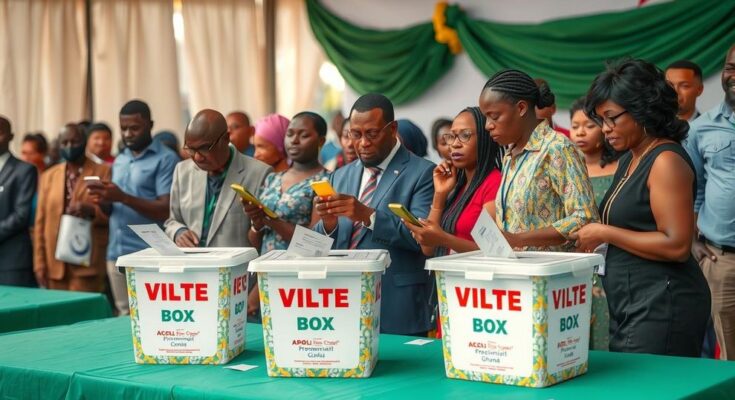Ghanaians voted in a closely contested presidential election amid economic challenges, focusing on candidates Mahamudu Bawumia of the NPP and John Mahama of the NDC. The economy’s struggles, such as inflation and a debt crisis, dominate voter concerns as they seek effective leadership moving forward.
On Saturday, Ghanaians cast their votes in a tightly contested presidential election, featuring Vice President Mahamudu Bawumia and former President John Mahama. This election is pivotal as the nation grapples with severe economic challenges following the worst financial crisis in decades, which included a significant debt default. As President Nana Akufo-Addo approaches the end of his two-term limit, the electorate focuses on economic recovery prospects fueled by Ghana’s status as a major cocoa and gold producer.
The economic situation, marked by high inflation and negotiations for a $3 billion IMF bailout, has emerged as the foremost concern for voters. With polls closing at 1700 GMT, early results are anticipated by Sunday and full presidential election results by Tuesday. Citizens, such as retired policeman James Nsiah, expressed their desire for change due to the challenging economic climate.
The dominant political parties, the ruling New Patriotic Party (NPP) and the National Democratic Congress (NDC), have alternated in leadership effectively since 1992. The NPP aims for a third consecutive term under Bawumia’s leadership, despite his association with the current administration’s economic performance. Bawumia, appearing optimistic about his prospects, highlighted governmental initiatives aimed at digital innovation and free education.
Additionally, the Ghanaian government imposed a temporary closure of land borders to protect the electoral process. Although inflation is showing signs of decline, many Ghanaians continue to face escalating living costs and job scarcity. Mahama, who previously served as president, seeks to capitalize on the discontent by promising to revamp the economy and create job opportunities through a “24-hour economy” initiative.
The electoral battleground has shifted, with the northern regions historically favoring the NDC, now becoming a contested area between the two candidates. Compounding these challenges is the widespread issue of illegal gold mining, exacerbating environmental concerns and affecting vital agricultural exports. Ghanaians have made it clear they seek effective leadership that addresses pressing economic issues with either candidate being an option for those yearning for improvement.
Ghana is undergoing significant political transitions as it prepares for presidential and parliamentary elections amid a dire economic crisis. The economy’s struggles have resulted in high inflation rates, widespread debt defaults, and an urgent need for recovery plans, affecting public sentiment and voter priorities. With a rich history of political stability, Ghana’s imminent vote will determine the leadership direction amidst growing frustrations from the electorate over current economic conditions. Key candidates from both major political parties highlight different strategies for addressing these issues, setting the stage for a compelling electoral contest.
In conclusion, the tight presidential election in Ghana underscores the critical economic challenges facing the nation. With voting concluded and results forthcoming, both candidates present contrasting visions for the country’s recovery. The electorate seeks transformative leadership capable of addressing immediate concerns, particularly the economy. The outcome of this election could significantly shape Ghana’s future and its approach to prevailing issues such as inflation, job creation, and environmental sustainability.
Original Source: www.france24.com




